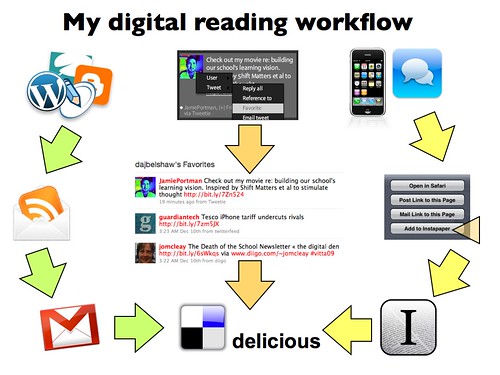
This evening I’ll be attending TeachMeet Midlands 2009 at the National College for School Leadership in Nottingham. If you’ve never heard of a TeachMeet before, they’re based around the idea of an unconference, ‘facilitated, participant-driven conference centered around a theme or purpose.’ (Wikipedia) I’ve been to a couple before – both of which were additions to the BETT Show – and they’re great events. There’s a fantastic buzz around the place, people passionate about what they do, and it’s a wonderful way to not only meet up with people you’ve only talked to online, but to come across new faces as well! 🙂
My (micro)presentation
I’ve signed up on the TeachMeet wiki to do a 7-minute micropresentation. Initially, I was going to talk about my role this year as E-Learning Staff Tutor and a bit about my Ed.D. on digital literacy. However, TeachMeets should be a lot more focused on classroom practice, so I’ve decided to instead talk about what I’ve been doing with my Year 10 History class.
This year I saw my having a new, fairly able GCSE History class as a good opportunity to try out some new methods and approaches to the course. As students at my school now have four lessons of their option subject per week instead of three, I decided to have one of them timetabled in an ICT suite. The room I was allocated has tiered seating and laptops, which was even better! :-p
After looking at various options, I decided to use Posterous for their homework blogs. Reasons for this include:
- Blog posts can be written by email.
- It deals with media in an ‘intelligent’ way (e.g. using Scribd to embed documents, making slideshows out of images)
- Avatars allow for personalization.
I set almost no homework apart from on their blogs. This means that on a Friday they start an activity using (usually) a Web 2.0 service and then add it to their blog via embedding or linking. The only problem with this has been Posterous not supporting iFrames, meaning that Google Docs, for example have to be exported to PDF and then uploaded. Students are used to this now and it doesn’t really affect their workflow.
Examples of student work
Links to all blogs can be found at http://mrbelshaw.posterous.com
Student feedback
I should, perhaps, have asked for parental permission to video students’ opinions about this approach. From what they tell me, they greatly enjoy working on their blogs. In fact, a Geography teacher at school has hijacked one of my students’ blogs so she does work for both History and Geography on it! I think they appreciate the following things:
- Presentation (a lot easier, especially for boys, to produce good-looking work)
- Multimedia (they’re not looking at paper-based stuff all the time)
- Collaboration (they get to work with others whilst still having ‘ownership’ of the final product on their blogs)
It’s a system that I’d definitely recommend and I shall be using in future! 😀
Short URL for this post (for Twitter, etc.) = http://bit.ly/4jD6V



